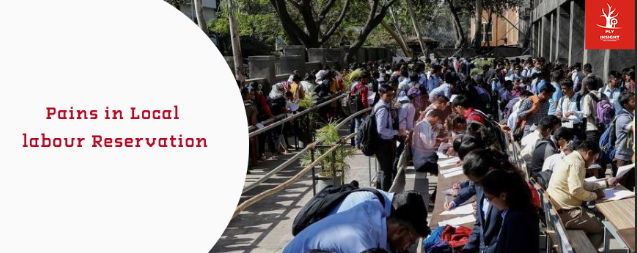
Pains in Local labour Reservation
- March 12, 2022
- 0
Haryana’s contentious law reserving 75 per cent of new hires in the private sector earning monthly salaries below R30,000 for people domiciled in the state is now before the Supreme Court. The appeal to the apex court comes from the state government, which is seeking to overcome a stay imposed by the Punjab and Haryana high court on February 3 in response to a bunch of writ petitions by industry groups. The high court’s order, which according to solicitor general Tushar Mehta’s plea before the supreme court for an early hearing, was delivered in 90 seconds and before he could complete two sentences, has raised a key issue for the country’s highest court to consider. That is, whether any state can restrict employment, even in the private sector, on the basis of domicile.
This is not a question restricted to Haryana but to several other states, so the Supreme Court’s ruling will have a significant bearing on the trajectory of hiring laws in India. Indeed, despite the fact that local job reservations contradict Article 16 of the constitution, which states that Indian citizens cannot be discriminated against employment or office on grounds of religion, race, caste, sex, descent, place of birth, or residence, several states have either passed laws or moved to do so over the past few years. Andhra Pradesh, Jharkhand, and Madhya Pradesh have all passed laws mandating between 70 and 75 per cent quota.
Significantly, Telangana, whose cabinet approved a proposal to reserve 80 per cent of semi-skilled jobs in the private sector for locals in August 2020, appears to have had a change of heart. A year later, the state’s IT and industries minister, K T Rama Rao, told the Assembly that the state government was against reservations in jobs. His reasoning had less to do with the niceties of constitutional rights than with the practicalities of attracting investment, especially in the IT sector. As Mr. Rama Rao explained, in a competitive world, Google, Amazon, or any other private company would not invest in the state if their employment options were restricted to locals. Instead, the state is following a two-pronged strategy of educating to local youths in marketable skills so that they get jobs without quotas even as the government offers industries that do employ locals some level of incentives.
The Telangana government’s rapid discovery of the downsides of politically motivated sub-nationalism and its solutions for dealing with the issue should send a strong message to other governments with similar inclinations. Indeed, Haryana Deputy Chief Minister Dushyant Chautala-led Jannayak Janata Party, which hoped to garner political mileage from this law, may find itself facing an even bigger problem of unemployment as the state’s vibrant start-up and manufacturing eco-systems shift to the relatively friendly neighboring regions of the National Capital Region- Delhi and Noida. This is the last thing Haryana can afford, given that the state has a high level of unemployment. The Supreme Court’s ruling will clarify matters either way, of course, but it is important that sates understand that in this period of record unemployment, India cannot afford the luxury of micro-chauvinism.
निजी रोजगार में आरक्षण का दर्द
हरियाणा का वह विवादास्पद कानून अब सर्वाेच्च न्यायालय के समक्ष है जिसमें उसने प्रावधान किया है कि 30,000 रुपये से कम के मासिक वेतन वाले रोजगारों में से 75 प्रतिशत राज्य के मूल निवासियों के लिए आरक्षित रहेंगे। इस मामले में राज्य सरकार ने सर्वाेच्च न्यायालय के समक्ष अपील की है जो पंजाब और हरियाणा उच्च न्यायालय द्वारा 3 फरवरी को लगाए गए स्थगन आदेश के खिलाफ है। उच्च न्यायालय का स्थगन आदेश औद्योगिक समूहों की ओर से लगायी गयी रिट याचिकाओं पर आया है। महान्यायवादी तुषार मेहता ने सर्वाेच्च न्यायालय के समक्ष जल्द सुनवाई का आग्रह करते हुए कहा कि उच्च न्यायालय ने महज 90 सेकंड के भीतर निर्णय सुना दिया जबकि तब तक वह दो वाक्य भी नहीं बोल पाए थे। बहरहाल उच्चतम न्यायालय के समक्ष यह एक अहम मसला है कि क्या कोई राज्य मूल निवास के आधार पर निजी क्षेत्र में भी रोजगार को रोक सकता है।
यह सवाल केवल हरियाणा तक सीमित नहीं है बल्कि कई अन्य राज्य भी इससे जुड़े हुए हैं, ऐसे में सर्वाेच्च न्यायालय का निर्णय देश में लोगों को काम पर रखने के कानूनों के लिए काफी अहम होगा। यह सच है कि स्थानीय स्तर पर रोजगार आरक्षण संविधान के अनुच्छेद 16 का उल्लंघन करते हैं। इस अनुच्छेद में कहा गया है कि रोजगार के मामले में देश के नागरिकों के बीच धर्म, नस्ल, जाति, लिंग, वंश परंपरा, जन्म स्थान, निवास आदि के आधार पर भेद नहीं किया जा सकता। परंतु बीते कुछ वर्षों में कई राज्यों ने ऐसे कानून बनाए हैं। आंध्र प्रदेश, झारखंड और मध्य प्रदेश ने 70 से 75 फीसदी कोटा तय करने वाले कानून पारित किए हैं।
अहम बात यह है कि तेलंगाना जिसने अगस्त 2020 में निजी क्षेत्र के अर्द्धकुशल रोजगार में 80 फीसदी तथा कुशल रोजगारों में 60 फीसदी स्थानीय लोगों के लिए आरक्षित करने का कानून बनाया था, उसका हृदय परिवर्तन हो गया है। एक वर्ष बाद राज्य के सूचना प्रौद्योगिकी तथा उद्योग मंत्री के टी रामाराव ने विधानसभा को बताया कि राज्य सरकार रोजगार में आरक्षण के खिलाफ थी। उनकी दलील का संवैधानिक अधिकारों से लेनादेना कम था और निवेश खासकर सूचना प्रौद्योगिकी क्षेत्र में निवेश की दिक्कतों से ज्यादा। जैसा कि रामा राव ने कहा भी, एक प्रतिस्पर्धी विश्व में गूगल, एमेजॉन अथवा कोई भी निजी कंपनी ऐसे राज्य में निवेश नहीं करेगी जहां उसके रोजगार विकल्प स्थानीय लोगों तक सीमित हों। इसके बजाय राज्य स्थानीय युवाओं को बाजार मांग के अनुरूप कौशल सिखाने की नीति पर काम कर रहा है ताकि उन्हें निजी औद्योगिक नौकरियों में सरकार के कोटा के बिना भी रोजगार मिल सके।
तेलंगाना सरकार को बहुत जल्दी समझ में आ गया कि राजनीति से प्रेरित उपराष्ट्रवाद में कई दिक्कतें हैं। उसने इस मसले से निपटने के लिए जो हल निकाला है उससे अन्य सरकारों को भी मजबूत संदेश मिलना चाहिए। यह सही है कि हरियाणा के उप मुख्यमंत्री दुष्यंत चैटाला के नेतृत्व वाली जननायक जनता पार्टी इस कानून से राजनीतिक फायदा लेना चाहती थी और अब उसे बेरोजगारी की बड़ी समस्या का सामना करना पड़ सकता है क्योंकि राज्य का जीवंत स्टार्टअप और विनिर्माण क्षेत्र राष्ट्रीय राजधानी क्षेत्र के अपेक्षाकृत अनुकूल पड़ोसी इलाकों दिल्ली और नोएडा में स्थानांतरित हो सकता है। हरियाणा में पहले ही बेरोजगारी बहुत ज्यादा है और ऐसा हुआ तो राज्य के लिए बहुत मुश्किल होगी। सर्वाेच्च न्यायालय का निर्णय चीजों को स्पष्ट करेगा लेकिन यह भी अहम है कि राज्य भी इसे समझें कि भीषण बेरोजगारी के इस दौर में भारत ऐसी सूक्ष्म अति राष्ट्रीयता झेल नहीं पाएगा।































































